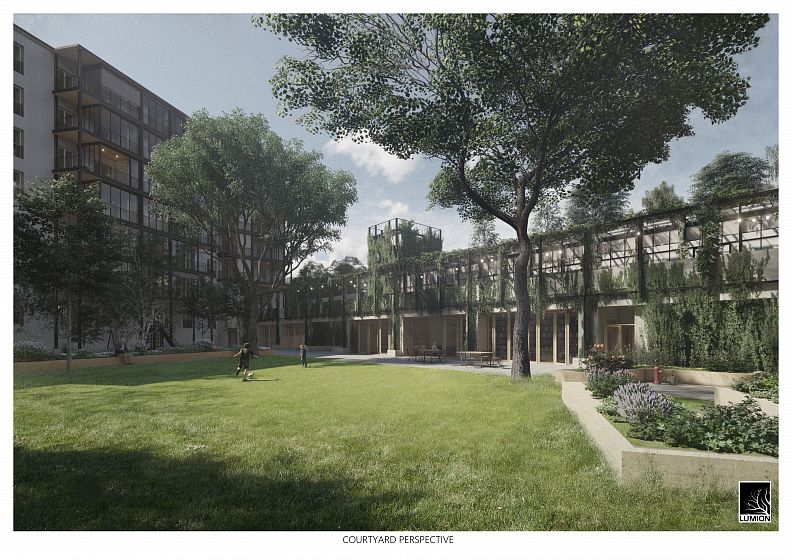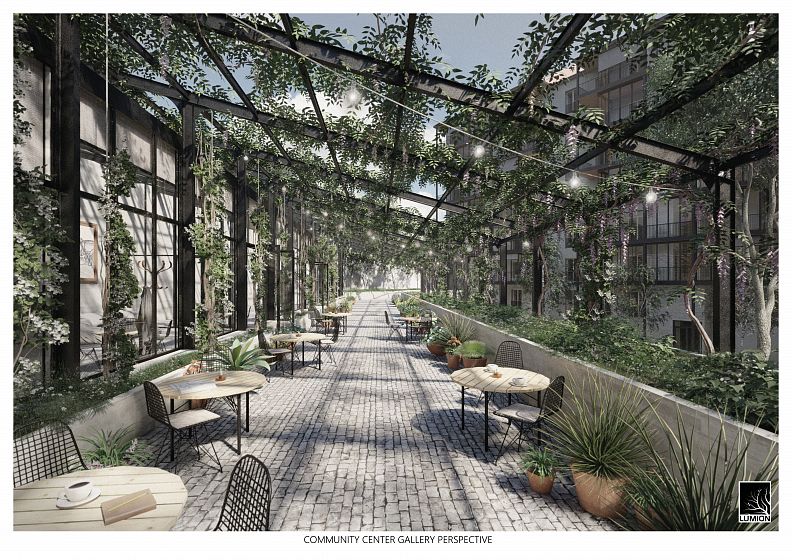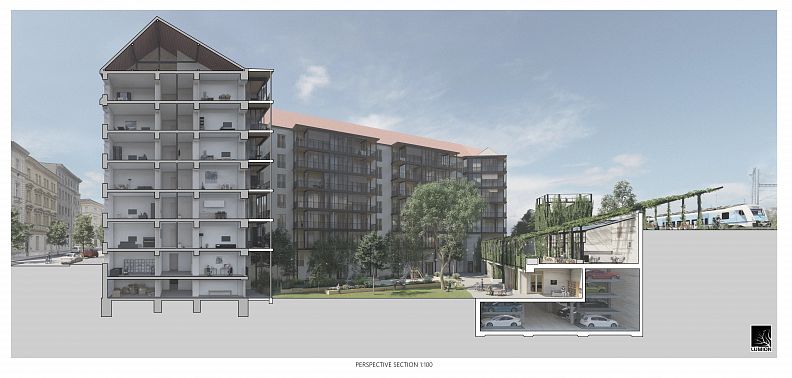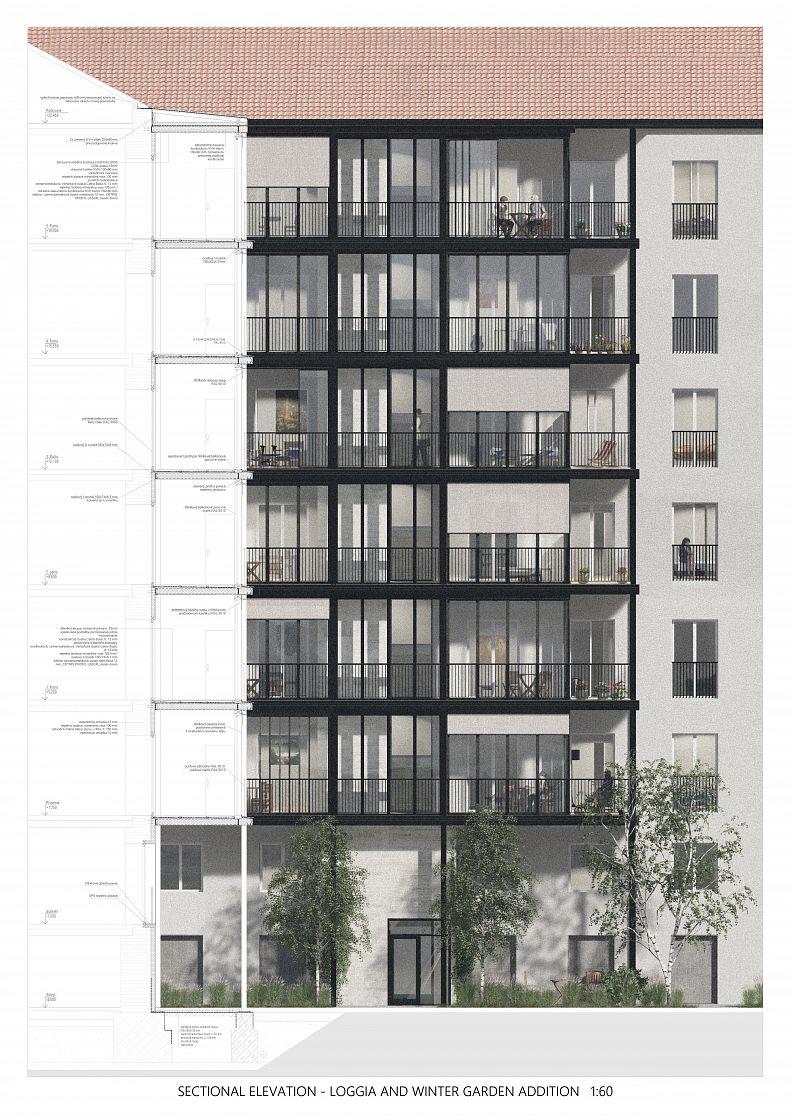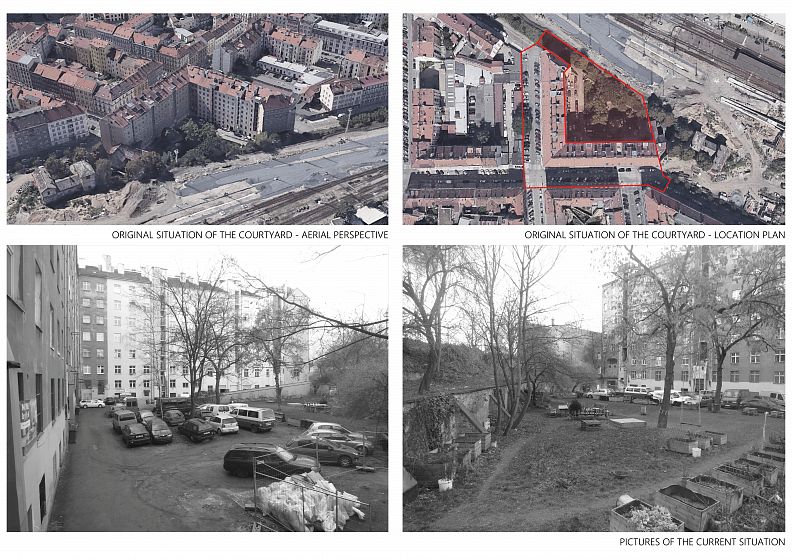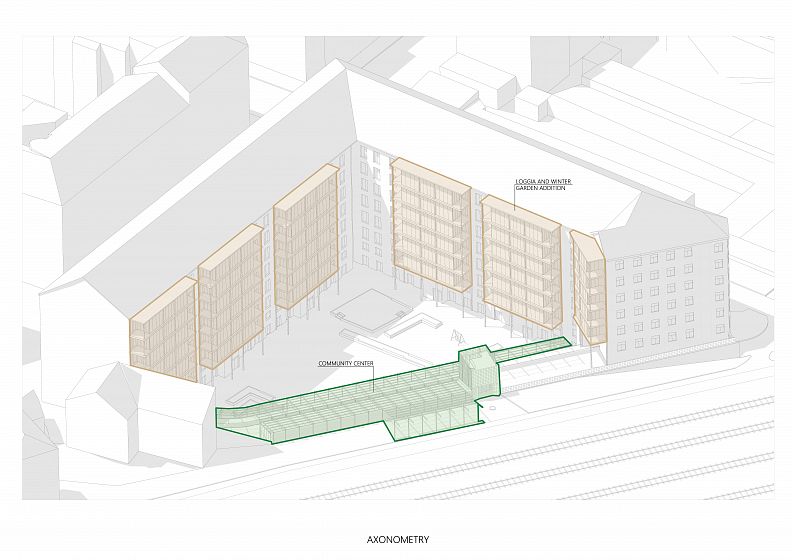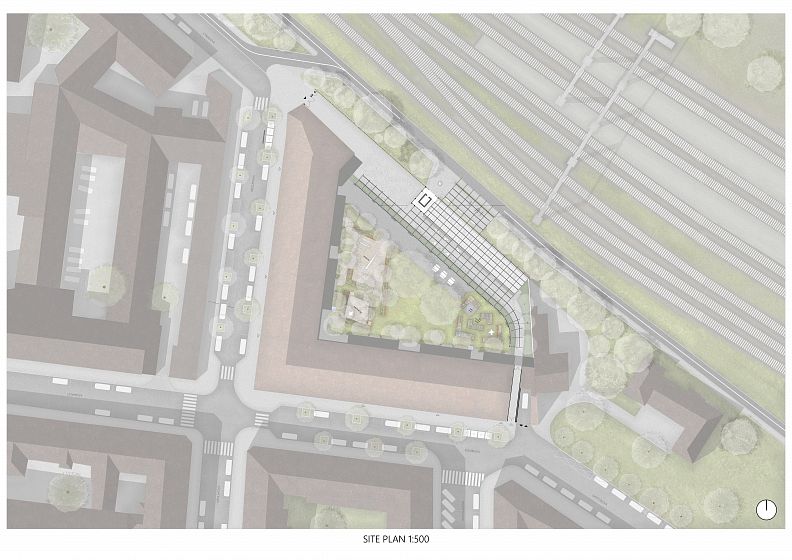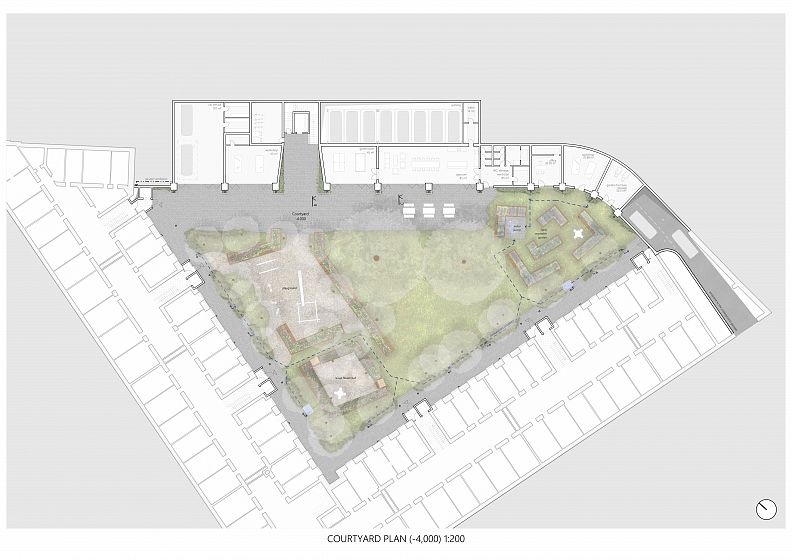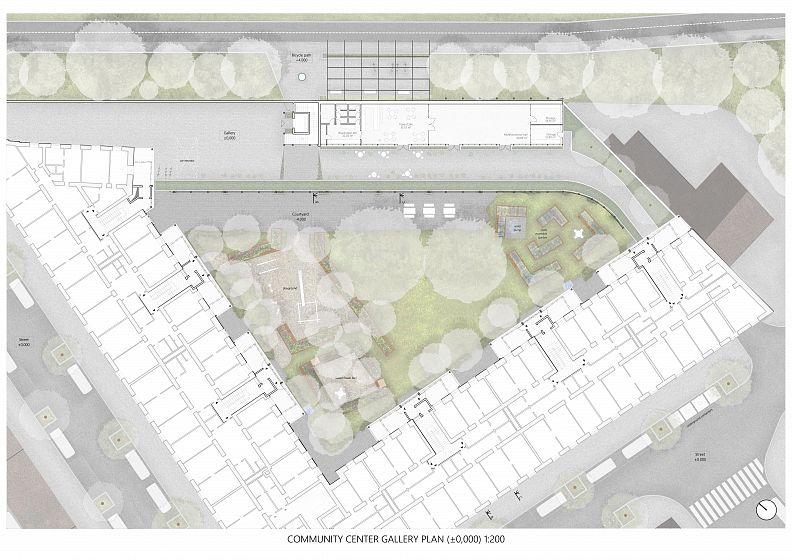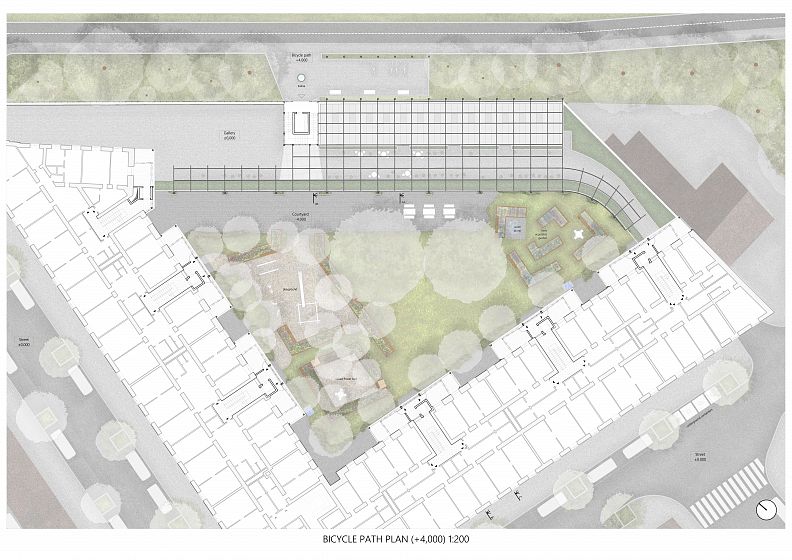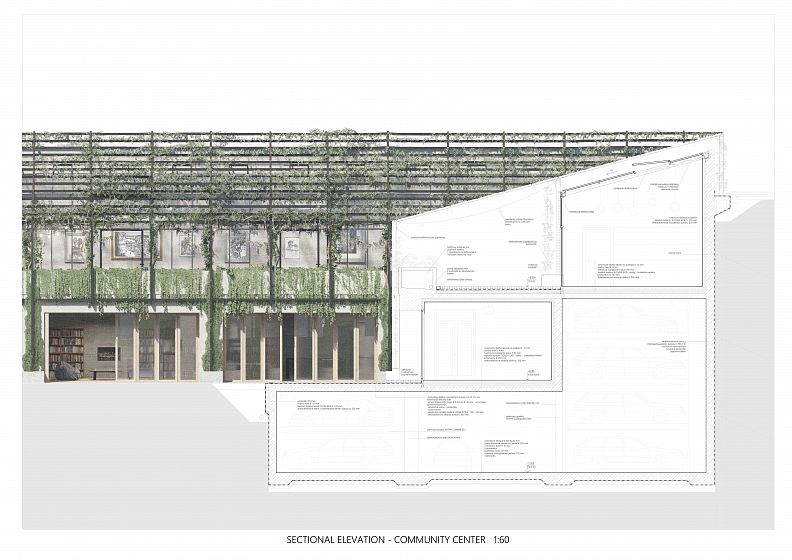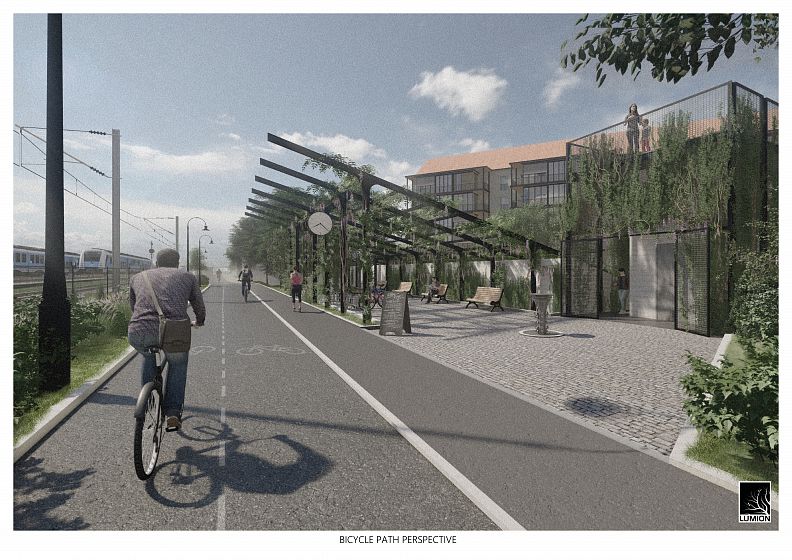Revitalization of the urban courtyard

Project idea
The aim of the proposal is the revitalization of the apartment building courtyard in Nusle, Prague 4 neighbourhood, between Prague-Vršovice train station and the Bratří Synku square. The project points out the current topic of currently idle public spaces of Prague courtyards. The aim of the project is to look for a possible solution of how to return life and natural elements into the urban environment.
The key idea of the project is a steel construction built in the courtyard and rising up to the railway line. This element is aligned with the edge of the courtyard and will cover the community centre embedded in the northern hillside. Climbing plants growing from the large flower pot on the gallery and from the landscape of the courtyard will create a “green pergola” that will imaginarily enclose the space of the yard. This will create a soft split form the publicly accessible gallery and shield the yard from the hectic railway both acoustically and visually.
Besides the proposal for the common courtyard, the project also proposes the following changes: addition of the courtyard tract (loggias and winter gardens) to the original apartment building, proposal for a community centre in the area of the courtyard, the advancement of the neighbouring streets, proposal of underground parking and lastly, the interconnection of the area and planned bicycle path running along the railway line.
Project description
The area is defined by the original apartment house from the south and the terraced terrain from the north neighbouring with the railway line.
The community centre embedded in the northern hillside opens up into the courtyard with communal spaces, playroom and workshops designed for the residents. The design of the yard outdoor spaces works around the idea of a large flower pot (as a reference to the flower pots on the gallery), which is transformed and by doing so creates spaces with different atmosphere and function while preserving the original motive. The flower pots - or lifted flower beds, separate the courtyard into smaller sections: the playground in the north-west side where the flower pots function also as improvised benches, the lifted area in the south-west side surrounded by smaller trees creating a cosy seating area, the central open space in front of the communal spaces of the community centre and herbal community garden in the east side.
The gallery of the community centre on the level of the street - the “Green Tunel” alley creates a common terrace in front of the greenhouse, functioning as a coffee shop and a multifunctional hall. The green pergola on the gallery creates shade during summer, and during winter allows the sunlight.
The project counts with the construction of the planned cycle route along the railway line. Therefore the outer area of the entrance to the courtyard is a sort of extension of the cycle route which will allow the cyclists to relax under the pergola or drink from the drinking fountain.
The originally weak social control over the common space of the courtyard solves the proposal of a stair tower with the possibility of time-regulated opening and closing of the individual levels in regards to the needs of the residents or the opening hours of the coffee shop and the multifunctional hall.
On the underground floors of the community centre is located garage with individual spots for the residents, accessible from Čestmírova Street. The landscaping of the neighbouring streets around the block reduces the number of parking spots, narrows down the oversized one-way street and proposes additional greenery.
By the creation of loggia and the winter gardens addition on the inner facade of the house, this project improves the quality of living spaces of the apartment building. The elevator is designed to be accessible from the landing of the original staircase and also from the floor of the reconstructed building, which creates barrier-free access for the resident of the building with their apartments oriented inside the courtyard.
Technical information
The underground garage and the lower floor of the community centre are constructed as a concrete skeleton. The steel construction of the greenhouse and its gallery is interconnected with the steel pergola. The supporting columns of the pergola on the gallery are also the columns into which the ceiling beams of the greenhouse are anchored through the construction element Shock Isokorb for the thermal bridge interruption. The greenhouse of the coffee shop and the multifunctional hall is ventilated through the roof windows, which are located far enough from the steel construction and climbing plants in order to avoid their collusion. The steel construction of the pergola is equipped with small stairs to allow regular maintenance of the glass roof. The interior of the greenhouse and the multifunctional hall is equipped with folding textile roof blinds.
The addition of winter gardens and loggias is constructed as a self-supporting steel construction.
The project includes blue-green infrastructure - water captured from the roof is drained to the storage tank located below ground level and subsequently used for watering the flower pots with the climbing plans on the gallery and for watering of the plants in the courtyard.
Co-authors
The proposal was created in cooperation with the artist Hugo Marek, whose ideas and sketches were integrated into the architecture, which is portrait into the significant presence of nature and plants as endless greenery filling the courtyard through the element of the pergola.
